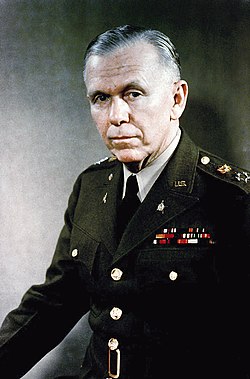
Back George C. Marshall Afrikaans جورج مارشال Arabic جورج مارشال (لعيب فوتبول امريكانى من امريكا) ARZ George Marshall AST Corc Marşall Azerbaijani جرج مارشال AZB Джордж Маршал Byelorussian Джордж Маршал BE-X-OLD Джордж Маршал Bulgarian জর্জ মার্শাল Bengali/Bangla
George Catlett Marshall | |
|---|---|
 | |
| 50th United States Secretary of State | |
| In office January 21, 1947 – January 20, 1949 | |
| President | Harry S. Truman |
| Preceded by | James F. Byrnes |
| Succeeded by | Dean Acheson |
| 3rd United States Secretary of Defense | |
| In office September 21, 1950 – September 12, 1951 | |
| President | Harry S. Truman |
| Preceded by | Louis A. Johnson |
| Succeeded by | Robert A. Lovett |
| 15th United States Army Chief of Staff | |
| In office September 1, 1939 – November 18, 1945 | |
| Preceded by | Malin Craig |
| Succeeded by | Dwight D. Eisenhower |
| Personal details | |
| Born | December 31, 1880 Uniontown, Pennsylvania |
| Died | October 16, 1959 (aged 78) Washington, D.C. |
| Political party | Democratic |
| Spouse(s) | Katherine Boyce Tupper Elizabeth Carter Cole |
| Alma mater | Virginia Military Institute |
| Profession | Soldier Statesman |
| Awards | Distinguished Service Medal (2) Silver Star Nobel Peace Prize |
| Signature |  |
| Military service | |
| Allegiance | |
| Branch/service | United States Army |
| Years of service | 1902–1945 also through to 1959 (General of the Army regulations) |
| Rank | |
| Commands | |
| Battles/wars | Philippine–American War World War I World War II |
George Catlett Marshall (December 31, 1880 – October 16, 1959) was an American military leader. He was Chief of Staff of the Army, Secretary of State, and the third Secretary of Defense. Marshall served as the United States Army Chief of Staff during World War II. As Secretary of State, his name was given to the Marshall Plan. For this plan, he was awarded the Nobel Peace Prize in 1953.[1]
Marshall joined the US Army in 1902. He served in France during World War I.
- ↑ W. Del Testa, David; Florence Lemoine and John Strickland (2001). Government Leaders, Military Rulers, and Political Activists. pp. 120.